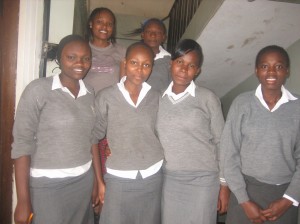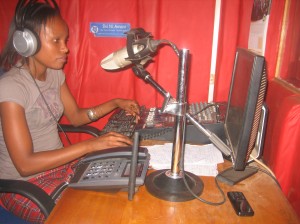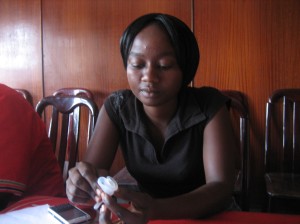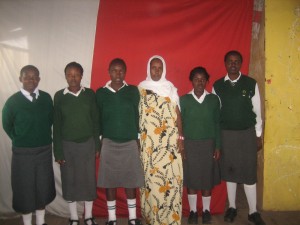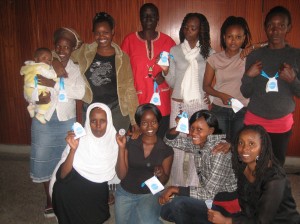Finally registered in Kenya
Posted: May 18, 2015 Filed under: UPDATES Leave a commentWe are glad to announce that Sisternet Kenya is finally registered in Nairobi as a community based organization. Congratulations to the kenyan team!!!!
Visiting the team in Kenya…
Posted: March 24, 2014 Filed under: UPDATES Leave a commentThis February, I was in Kenya for two weeks. I met with Sisternet women in Nairobi twice and, I can assure you, they are dedicated and they are doing a great job. Since reproductive health issues are taboo, they make an effort in getting a good report with the girls. And they succeed. On the other hand, this creates a situation where the girls can bring up other urgent questions that the team leaders sincerely try to address. We talked about these challenges that the team leaders face and the need to find ways to solve these serious issues one by one. For instance, while I was there, a female doctor was asked to assist girls in cases like early pregnancy and other reproductive health issues. I would not be surprised if solutions to other challenges are presently tried out.
I really appreciated being able to meet the girls in the schools in two informal settlements. They told me their goals in life and they have high aspirations, they want to become doctors, lawyers, journalists, nurses. School starts at 7 or 8 in the morning and goes on until 5 in the afternoon. We met on a Saturday and they were brought out from class to our meeting. They told me some of their challenges. Even though I am used to listening to strong life stories, with some girls and being in their environment, it did hurt to hear what they are facing. It became even more obvious how important the menstruation cup is for them to improve life.
I brought 50 menstruation cups to Nairobi. The girls will be on vacation in March and then they will meet with the team leaders doing a picnic in a park. There they will receive the cup.
This project is implemented by local women who know the prerequisites, the target, the demands etc on life in an informal settlement. We all cooperate and it is fantastic to take part in such important work, to be a member of Sisternet.
Written by
Eva Lundbäck
Sisternet partners with SuSanA.
Posted: March 8, 2012 Filed under: UPDATES Leave a commentThe Sustainable Sanitation Alliance (SuSanA) is an informal network of organisations who share a common vision on sustainable sanitation. SuSanA came into existence in early 2007 and works as a coordination platform, working platform, sounding board, contributor to the policy dialogue on sustainable sanitation and as a “catalyst”. At the present time, the secretariat function is carried out by GIZ (German International Cooperation) and the current number of partners is displayed at the bottom of this page.
Participation is open to those who want to join and be active in the promotion of sustainable sanitation systems. The SuSanA invites international, regional and local organisations to join the network, contribute ideas, and to become active partners in the thematic working groups.
Projektdag for sistercup
Posted: November 23, 2011 Filed under: UPDATES 1 CommentVälkommen till projektdag Sistercup!
Nu är pilotarbetet färdigt och vi vill gärna dela med oss av de spännande resultaten till Dig som donerat en menskopp eller på annat sätt intresserar Dig för projektet.
Lördagen den 3e december kl 14-18
Tobaksspinnargatan 1, Stockholm
Mingel
Rapport
Bildvisningar
Loppis
Glögg- & kaffeförsäljning
Organisationen Sisternet vill med projektet Sistercup introducera menskoppen som sanitetsalternativ och därmed underlätta för skolflickor i Nairobis slumområden att delta i skolundervisningen även under menstruation. Läs mer om projektet här på bloggen
Project photos
Posted: October 19, 2011 Filed under: UPDATES Leave a commentSome more photos……
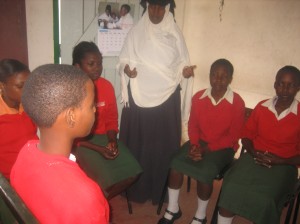
Dhahabu, our team leader having a dialogue circle discussion with students from Tumaini secondary school.
A learning experience
Posted: September 14, 2011 Filed under: UPDATES 1 CommentIt has been a very exciting journey for us here in Sweden and for our coordinator, our team leaders and the participating school girls in Kenya. It has been a learning experience for Sisternet in implementing and working with menstrual cups as an entry point to having girls discuss about their menstruation and reproductive health.
Our pilot project is nearly completed now, and we are busy with evaluating and fundraising for the next phase of the project. This also entails discussing further collaboration with different organisations that have similar goals.
The overall response from the participating schoolgirls has been very positive.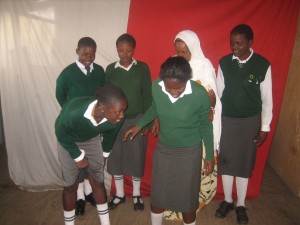
Along the way, we have acquired new knowledge and faced different challenges. We have encountered stigmatization and taboos sorrounding menstruation that hinder women’s empowerment. It has become clear to us that in the next phase of our project we need to further adress these issues by means of more training on Reproductive and Womens Rights .
Sistercup Kicks off successful in the slums of Nairobi
Posted: March 2, 2011 Filed under: UPDATES 4 CommentsThe Sisternet pilot project “Sistercup” kicked off successfully in December 2010 after fundraising for 125 menstrual cups from friends and families in Sweden. The project was received with lots of enthusiasm and energy in Kenya, at that time we had three members of Sisternet in Kenya who introduced the project to the curious team leaders. Our partnering organisation Human Rights City had already identified 10 team leaders who were going to work in Korogocho and Maili Saba slum in Nairobi.
On the 8th of december we had an introduction meeting with the team leaders, they were very curious about how menstrual cups worked and especially because it was the first time that most of them heard about them. During the meeting, the team leaders asked many questions about the menstrual cup and it safety and general questions of how to use and clean the cup. We answered their questions by going through the guidelines that we had prepared for them. The team leaders also underwent a one-day dialogue circle workshop, to equip them with different methods for having fruitful discussions with the girls. After the training the team leaders were each given a menstrual cup. After having used the menstrual cup for a month, we received a feedback from the team leaders that served as an eye opener to us.
During the end of January 2011, 50 girls from 10 different schools aged from 15-18 were identified and given menstrual cups. Our team leaders are holding dialogue circles with them about reproductive health, sanitation and their experiences on the usage of the menstrual cup.
We are still gathering the girls experiences and at the same time in the process of fundraising to be able to have more trainings and dialogue circles gathering on Reproductive health and Menstrual cups to Korogocho and Maili Saba community. We will give out the other 50 Menstrual cups after the completion of the first phase with the 50 girls that we are currently working with.
.
125 Menstrual cups donated so far and still counting….
Posted: October 18, 2010 Filed under: UPDATES 2 CommentsHi everybody,
Big upps to all of you who have donated and to those who are in the process of doing so.
The Sistercup Pilot Project is being received with lots of enthusiasm and is carrying with it the importance of promoting Sisterhood among Women . We are now halfway to reaching our goal of donating 100 menstrual cups to young girls in the informal settelments of Nairobi. The pilot project will kick off in two slums known as Korogocho and Maili Saba.
We want to send out a big THANK YOU to all the people who have contributed to this important project. Thanks to you, 100 kenyan girls living in the slums of Nairobi will be able to attend school without interruptions and worries about how to deal with their menstruation.
Please subscribe to our blog to follow our progress!
The Sistercup Pilot Project
Posted: October 11, 2010 Filed under: UPDATES Leave a commentIn December 2010 Sisternet will begin implementing The Sistercup Pilot Project in the informal settlements of Nairobi ,Kenya. The members of the network have taken on the task of finding donors for 100 menstrual cups to be distributed to young girls who lack affordable and sustainable methods for dealing with menstruation.
Two of our members will be going to Nairobi to start up dialogue circles with 15-18-year-old girls. This will be done in collaboration with a local member who will be responsible for conducting the dialogue circles and for gathering information for the evaluation of the project.
Here on the blog you will be able to follow the progress of The Sistercup Pilot Project.
What is a Menstrual cup
Posted: October 6, 2010 Filed under: UPDATES Leave a commentA menstrual cup is a type of cup worn inside the vagina during the menstruation. The menstrual cup collects the menstrual fluid rather than absorbing it like the pads and tampons. There are two types of menstrual cup currently available. The first is a soft, flexible, disposable cup made of polyethylene and looks like the contraceptive diaphragm. The second type is a bell-shaped cup made of rubber (latex), silicone or thermoplastic elastomer (TPE). It is reusable and designed to last for up to 10 years. Some brands recommend replacement each year, 5–10 years or state that women have been comfortable using them up to 10 years.
Soft, disposable menstrual cups may be worn during sex, though they are not contraceptive devices. The bell-shaped silicone or rubber cups must be removed before penetrative vaginal sex.
Some women opt for a menstrual cup because it does not absorb natural vaginal secretions as a tampon or sponge would. For some women, menstrual cups are more difficult to insert and remove than tampons. They also may be messier than tampons to remove.[3] In a 1995 clinical study involving 51 women, 23 women (45%) found menstrual cups to be an acceptable way of managing menstrual flow.
For more information go to;
en.wikipedia.org/wiki/Menstrual_cup






